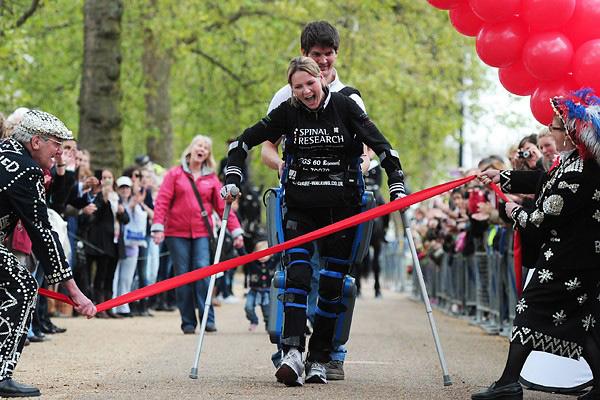 Brit Claire Lomas, paralyzed from the chest down following a horse-riding accident five years ago, has become the first person to take home a bionic exoskeleton that allows her to walk.
Brit Claire Lomas, paralyzed from the chest down following a horse-riding accident five years ago, has become the first person to take home a bionic exoskeleton that allows her to walk.
Claire first hit the headlines back in May when the 32-year-old paraplegic completed the London marathon with the aid of the ReWalk robotic exoskeleton, raising over £200,000 ($317,000) for spine injury research in the process. The impressive feat took her 16 days and won her many fans along the way. More recently, she also had the honor of lighting the celebration cauldron in London’s Trafalgar Square to begin the 2012 Paralympics.
Her life will be changed forever now that she can use the ReWalk during her everyday activities, bringing her a level of mobility she could never have imagined back in 2007 when, following her accident, doctors told her she would never walk again.
‘Excited’
“I am very excited to take the ReWalk home and incorporate it in my daily life,” Claire said in a statement. “With the help of the ReWalk I am able to stand, walk, talk to my friends and family eye-to-eye, and exercise in a way that I have not been able to since my injury.”
Built by Israel-based Argo Medical Technologies, the ReWalk enables a user to control the robotic exoskeleton through tiny changes in their center of gravity. Crutches can be used to provide the user with extra stability and safety.
The robotic exoskeleton is made up of a number of motors and gears strapped to the user’s lower body, with sensors attached to the upper body helping to control motion. When ReWalk detects the user moving their weight onto one foot, it raises the opposite leg and carries the person forward.
The device is powered by a computer and a rechargeable battery housed in a backpack. Once a user gets the hang of it and feels confident enough, even stairs no longer become an obstacle.
Official launch
“Years of research and hard work from a very talented team of engineers has made this product possible,” Larry Jasinski, Argo’s CEO, said. “We are officially launching the ReWalk personal use system in the EU with this start in the UK. It’s our aim to get as many individuals as possible walking again, and the launch of the ReWalk will allow customers to use the technology for a range of activities.”
The robotic exoskeleton was recently given approval by the US Food and Drug Administration, though it is yet to go on general sale in the country.
At £45,000 ($71,000), the ReWalk certainly doesn’t come cheap. However, it is likely to prove popular with rehabilitation centers and other medical institutions.



